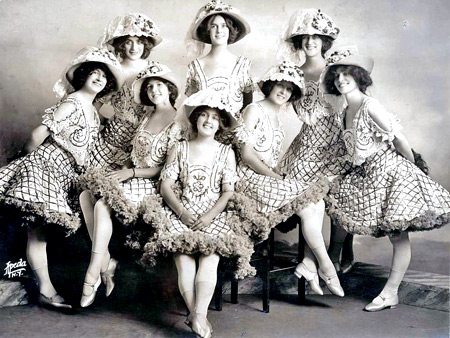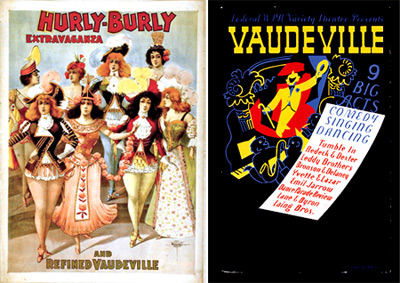Vaudeville was a form of variety entertainment that flourished in the United States around the 19th century and in its time was the most popular form of American entertainment.
 It featured a diverse lineup of performances, including comedians, singers, dancers, animal tricks, strongmen and much more. Vaudeville played a significant role in shaping American popular culture and providing entertainment for audiences in all communities and was a complete representation of America’s identity of the time, warts and all.
It featured a diverse lineup of performances, including comedians, singers, dancers, animal tricks, strongmen and much more. Vaudeville played a significant role in shaping American popular culture and providing entertainment for audiences in all communities and was a complete representation of America’s identity of the time, warts and all.
The roots of vaudeville can be traced back to the variety shows prior to the American Civil War of the 1860s, evolving gradually from the Music Hall, basically a theater with a saloon where patrons could enjoy a drink and a show. These early variety shows were very much male oriented, and featured a lot more bawdy and risque acts, like burlesque.
Cleaner version
Tony Pastor, one of the pioneers of Vaudeville as it is known today, presented a cleaner, polite version of the existing variety shows to middle class audiences in order to achieve broader appeal, prohibiting the sale of alcohol in his theatres, and opening them up to both male and female audiences.
 Though he wasn’t the originator of the term, he would later adopt the term ‘Vaudeville” to refer to his performances, and with his success, many other producers would follow suit. By the 1900s, there were thousands of vaudeville theaters around the country, and the term itself was commonly understood by the public to refer to the best form of entertainment around.
Though he wasn’t the originator of the term, he would later adopt the term ‘Vaudeville” to refer to his performances, and with his success, many other producers would follow suit. By the 1900s, there were thousands of vaudeville theaters around the country, and the term itself was commonly understood by the public to refer to the best form of entertainment around.
The typical vaudeville program or “bill” was made up of a series of short acts by around a dozen different performers, each lasting around ten to fifteen minutes performed twice a day for a week before the troupe moved to another town.
By the turn of the century, Vaudeville became big business in America, creating a monopoly network or circuit of the best theaters to perform at for the best chance of success called the “Big Time”, a Vaudeville phrase that entered common use, which artists would dedicate their entire lives trying to break into. At its peak, the industry would employ around 12,000 different performers at any one time.
Racial segregation
Though Vaudeville showcased a lot of the racially discriminatory views of the time through their minstrel and blackface shows, it also provided a platform for performers from marginalized communities, including African Americans, immigrants, and women.
African American performers such as Bert Williams, Aida Overton and Bill “Bojangles” Robinson gained fame on their own racially segregated vaudeville circuits which performed for both black and white communities. They directly challenged the prevailing racial stereotypes of the time with their art, paving the way for future generations of black entertainers.
Similarly, Vaudeville offered opportunities for female performers to showcase their talents and achieve success in a male-dominated industry. Women such as Mae West, Trixie Friganza, and Sophie Tucker became Vaudeville stars, captivating audiences with their wit, charm, and vocal talents.
By the early 20th century, Vaudeville had become a thriving industry, with theaters and booking agencies operating in cities across the country but the rise of new forms of entertainment created challenges that led to its decline.
Films outright stole its spot as the most popular form of entertainment. Silent films were already a challenge, but with the advent of sound films and cinemas becoming more affordable to the public, it was no contest. The 1929 stock market crash and subsequent economic challenges brought on by the Great Depression forced many Vaudeville theatres to close, and was a greater incentive for the public to choose cheaper forms of entertainment.
A lot of Vaudeville’s greatest talents would make the jump to film and radio, capitalizing on their existing popularity in a much more profitable industry.
The vaudeville tradition also lives on in modern variety shows, comedy clubs, and live entertainment venues, preserving the spirit of this unique and vibrant form of entertainment for future generations.




